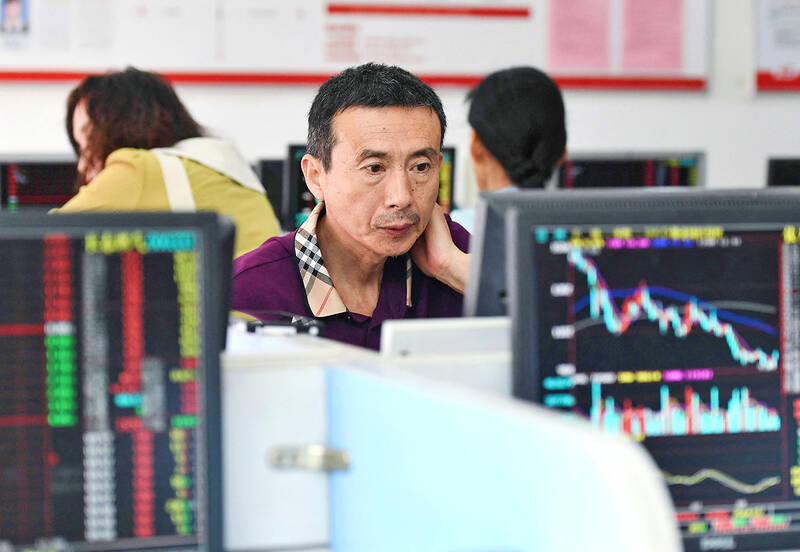Many Chinese are venting their frustration at China’s slowing economy and weak stock markets in an unconventional place: the social media account of the US embassy in Beijing.
A post on Friday on protecting wild giraffes by the US embassy on Weibo (微博), a Chinese platform similar to X, has attracted 130,000 comments and 15,000 reposts as of yesterday, many of them unrelated to wildlife conservation.
“Could you spare us some missiles to bomb away the Shanghai Stock Exchange?” one user wrote in a repost of the article.

Photo: AFP
The Weibo account of the US embassy in China “has become the Wailing Wall of Chinese retail equity investors,” another user wrote.
The US embassy did not immediately respond to a Reuters request for comment.
While Weibo users can publish individual posts about the market and the economy, Chinese authorities regularly block what they view as “negative” online comments when they gain traction.
The commenting function on posts related to the economy or the markets on social media platforms can also be turned off or only show selected comments, restricting channels in which people can express their opinions.
China’s blue-chip CSI300 Index tumbled 6.3 percent last month, plumbing five-year lows after a raft of government support measures failed to prop up confidence dented by multiple economic headwinds, including a multi-year property slump, tepid domestic consumption and deflationary pressures.
Late last month, Chinese state media reported that China would take more “forceful” measures to support market confidence following a Cabinet meeting chaired by Chinese Premier Li Qiang (李強).
Chinese authorities have since ramped up efforts to calm investors, sending out positive messages that sometimes produce the opposite effect.
On Friday, the official People’s Daily published an article with the headline: “The entire country is filled with optimism.”
The headline was soon mocked on Chinese social media.
A Weibo user, in a repost of the US embassy’s giraffe protection article, wrote: “The entire giraffe community is filled with optimism.”

In Italy’s storied gold-making hubs, jewelers are reworking their designs to trim gold content as they race to blunt the effect of record prices and appeal to shoppers watching their budgets. Gold prices hit a record high on Thursday, surging near US$5,600 an ounce, more than double a year ago as geopolitical concerns and jitters over trade pushed investors toward the safe-haven asset. The rally is putting undue pressure on small artisans as they face mounting demands from customers, including international brands, to produce cheaper items, from signature pieces to wedding rings, according to interviews with four independent jewelers in Italy’s main

Japanese Prime Minister Sanae Takaichi has talked up the benefits of a weaker yen in a campaign speech, adopting a tone at odds with her finance ministry, which has refused to rule out any options to counter excessive foreign exchange volatility. Takaichi later softened her stance, saying she did not have a preference for the yen’s direction. “People say the weak yen is bad right now, but for export industries, it’s a major opportunity,” Takaichi said on Saturday at a rally for Liberal Democratic Party candidate Daishiro Yamagiwa in Kanagawa Prefecture ahead of a snap election on Sunday. “Whether it’s selling food or

CONCERNS: Tech companies investing in AI businesses that purchase their products have raised questions among investors that they are artificially propping up demand Nvidia Corp chief executive officer Jensen Huang (黃仁勳) on Saturday said that the company would be participating in OpenAI’s latest funding round, describing it as potentially “the largest investment we’ve ever made.” “We will invest a great deal of money,” Huang told reporters while visiting Taipei. “I believe in OpenAI. The work that they do is incredible. They’re one of the most consequential companies of our time.” Huang did not say exactly how much Nvidia might contribute, but described the investment as “huge.” “Let Sam announce how much he’s going to raise — it’s for him to decide,” Huang said, referring to OpenAI

The global server market is expected to grow 12.8 percent annually this year, with artificial intelligence (AI) servers projected to account for 16.5 percent, driven by continued investment in AI infrastructure by major cloud service providers (CSPs), market researcher TrendForce Corp (集邦科技) said yesterday. Global AI server shipments this year are expected to increase 28 percent year-on-year to more than 2.7 million units, driven by sustained demand from CSPs and government sovereign cloud projects, TrendForce analyst Frank Kung (龔明德) told the Taipei Times. Demand for GPU-based AI servers, including Nvidia Corp’s GB and Vera Rubin rack systems, is expected to remain high,